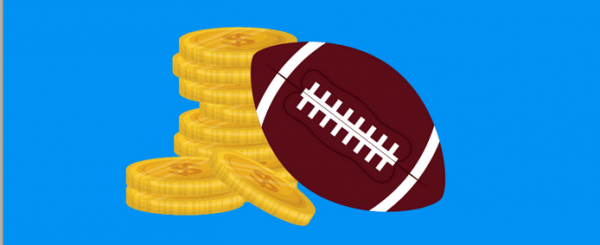Content Providers Look to Cash in On Legal Sports Betting in the US
With legal sports betting spreading like wildfire in the United States, it's not surprising that content providers are looking to cash in bigly.
Digiday looked at a handful of the players already establishing a foothold.
The legalization of sports betting is expected to drive more ad revenue for publishers, much of that coming from Draftkings and FanDuel alone in the early stages. Back in 2015, both those sites spent millions in advertising. One couldn't watch an NFL game without seeing ads for either company.
As more states legalize sports betting, new games and services are expected to spring up and use TV networks and sports publishers to advertise them, Digiday noted.
The Big Boys
CBS Sports - They debuted a metrics-driven analysis and advice show geared towards sports betting and fantasy sports via their CBS Sports HQ streaming channel. The show is called “SportsLine Edge”. CBS has long focused on fantasy sports, which many believe is a lighter form of sports gambling.
That show will start with 11 hours of programming per week and expand to stream every day in the coming weeks, CBS Sports said.
BarStool Sports - “Barstool Sports Advisors” features Dave Portnoy and other Barstool Sports personalities discussing wagering via their own produced local television show that can be seen in New York, Boston, Philadelphia and Chicago. That's a great market to be sure.
Bleacher Report - They premiered a new NFL-focused show called “Simms & Lefkoe: The Show”. Viewers will get to bet on games with the show's host. Bleacher Report has touched on gambling in the past via its content but this represents the first time they are jumping into gambling-themed video programming realm.
“We really believe this is our venue to do more experimentation around the topic of betting,” Bleacher Report’s svp of content, Joe Yanarella, told Digiday. “We’re laying breadcrumbs for the future.”
A New Wave of Affiliate Marketing
Established online gambling affiliates are looking to capitalize on the new sports wagering market in the United States. They'd be fools not to. A good chunk of these affiliates actually got their start promoting a large selection of sportsbooks that catered to American citizens in the early to mid-2000's.
Regulatory constraints forced many of the top betting firms out of the U.S. market post-2008. Only the strong affiliate marketers survived. Most had to focus their attention on Europe.
The U.S. sports betting market is back with a vengeance. But the vast majority of affiliates question how to tap into it. Many have asked our advise here at Gambling911.com.
Case in point: When New Jersey first legalized online poker and casino games a few years back, the state's Attorney General sent out an ominous letter warning content providers not to promote the New Jersey sites along side offshore poker rooms and casinos. This prompted some affiliates to develop secondary sites focused specifically on New Jersey. There wasn't a whole lot of money to be made in doing this however and the new sites had trouble delivering to such a saturated market with so little readership.
Sites do have the option of geotargetting banner creatives. And this could certainly satisfy some state interests. Content cannot be geotargetted, including content that may feature links to offshore gambling sites. Compromise is almost inevitable on this front.
LegalSportsReport.com and PlayNJ.com appear to have the early monopoly on promotion of stateside Web gambling sites and will likely benefit from ad spends. Sites like Gambling911.com often draw from more specified local gambling search inquiries as the site is more educational in nature and has never shunned gambling sites that operate in jurisdictions where such activity is legal.
It is unclear at this time whether the traditional affiliate business model can be successful as legal sports betting spreads in the states. Privacy concerns and regulatory measures such as those imposed by the European Union recently have resulted in tech companies like Apple eliminating ad tracking cookies on their safari browsers after 24 hours, and they expect to block cookies by default altogether this fall. Google and other competitors will likely follow suit as these privacy pressures mount.
New Jersey and other state-operated sportsbooks will mostly rely on app downloads. CPI or Cost Per Install could dominate on the affiliate marketing front.
These are the current Key Average Cost Per Install statistics:
iOS app CPI Globally – $0.86
Android app CPI Globally (Google Play market) – $0.44
iOS app CPI in US – $2.07
Android app CPI in US (Google Play market) – $1.72
Cost Per Install on Facebook Ads – $1.8
Cost Per Install on Twitter Ads – $2.53
Cost Per Install on Instagram Ads – $2.23
Cost Per Install on Search Ads – $1.00
More likely companies looking to gain a competitive edge will hone in on sites that are already entrenched in the U.S. sports betting market and pay top dollar flat ad fees. It's easy enough to tell which content providers have top exposure in the space.
Final Word on Sports Handicappers
Make no mistake about it. This is a field that should explode as more and more people start betting.
Aggressive and targeted marketing will be necessary of course.
Gambling911.com has seen ZERO sign of any boost in content from sports handicappers thus far, so sky is the limit.
- Alejandro Botticelli, Gambling911.com















